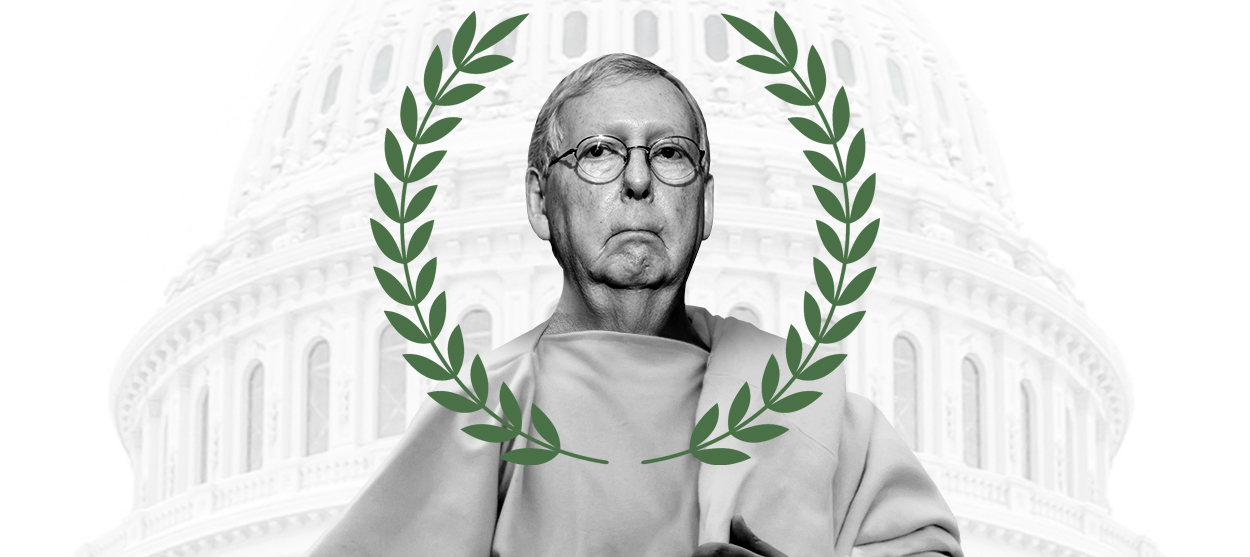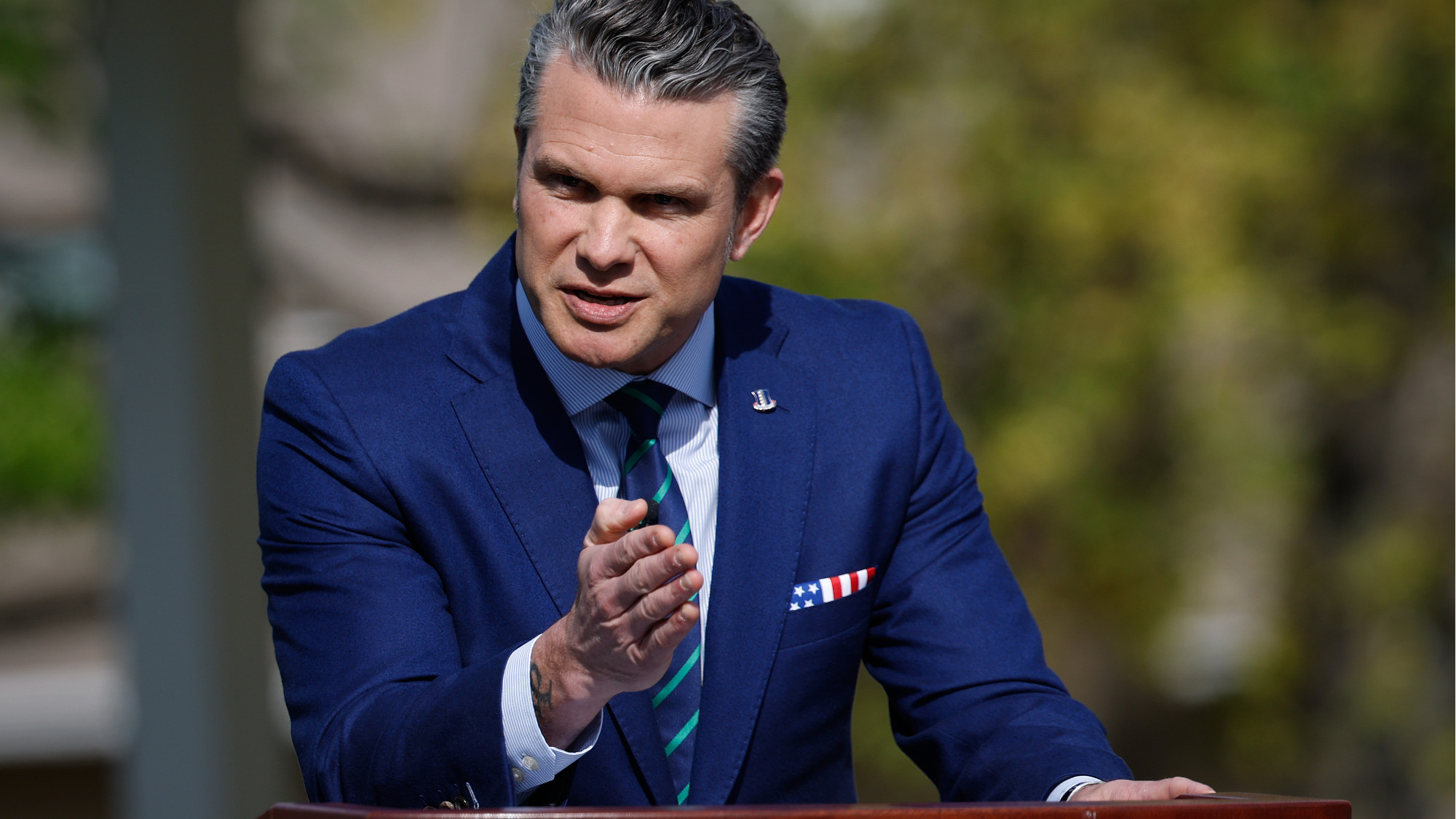Sen. McConnell the Elder and the fall of the American Republic
A future history of the fall of America


A free daily email with the biggest news stories of the day – and the best features from TheWeek.com
You are now subscribed
Your newsletter sign-up was successful
GENEVA, 2147 — The North American territory between Canada and Mexico is, as everyone knows, a blighted dystopian hellscape. Just last month United Nations peacekeepers attempting to mediate between the Fuddruckers Free State and the New Virginia Republic were attacked by "coal bandits" — part of a primitive nomadic tribe that practices a ritual in which this type of rock is set ablaze in great heaps to appease the gods. Luckily, the troops were able to withdraw before the heavily-armed irregulars, operating an early 21st-century type of wheeled transportation known as an "F-350 Super Duty," could cut them off.
A century and a half ago, this region was home to by far the most powerful nation on Earth: the United States. Many have attempted to explain its downfall — suggesting a decline in civic virtue, an inability to move past filthy fossil fuel energy sources, a poor diet, or other reasons.
But modern scholars have settled on a political explanation. The United States partly based its constitutional system on an even older nation, the Roman Republic. In the end it collapsed for roughly the same reason its ancient ancestor did — a wealthy aristocratic elite strangled vitally-needed reforms for so long that the national government lost all legitimacy and fell apart.
The Week
Escape your echo chamber. Get the facts behind the news, plus analysis from multiple perspectives.

Sign up for The Week's Free Newsletters
From our morning news briefing to a weekly Good News Newsletter, get the best of The Week delivered directly to your inbox.
From our morning news briefing to a weekly Good News Newsletter, get the best of The Week delivered directly to your inbox.
The rapid decline of the U.S. accelerated during the coronavirus pandemic of 2020. In almost all countries this caused tremendous economic problems, because to control the virus as many people as possible had to stay at home to avoid becoming infected. Poor countries were especially hard-hit, as they struggled to afford rescue measures. However, almost all rich countries eventually weathered the storm. The strategy was simple — national governments kept their citizenry solvent through direct payments, or by paying businesses to maintain their employees on staff, while they built up their health care system to prevent the virus from spreading.
The U.S. was the one significant exception. Its legislative Congress (divided into two parts, a House of Representatives and a Senate) did pass economic rescue measures, but they were weeks late, heavily slanted towards wealthy elites, and even then plainly short of what was necessary. Meanwhile, the U.S. president at the time was Donald Trump, an unhinged former television celebrity, and he did almost nothing to control the epidemic, which would continue to grip the U.S. more than a year after it had been controlled in every other rich country. United States citizens were banned from traveling to most countries, and it was around this time that Mexico began constructing the famous "Gran Muralla" across its northern border to keep infection (and later, armed extremist militias) out.
More importantly, after the initial rush of panic, the Senate, led by Mitch McConnell "the Elder" (so named because he remained in politics until 2032 at age 90), blocked all further rescue measures. This branch of Congress had two seats for every state regardless of population, meaning the 40 million residents of California had the same influence as the 600,000 residents of Wyoming. As a result, states representing just 16 percent of the population could form a Senate majority.
The framers of the U.S. Constitution thought the Senate would forestall power grabs from the more democratic House, following Roman thinking that it was important to have a separation of powers. Instead the Senate evolved into a near-insurmountable roadblock before any decent policy. Even though the United States controlled the world's reserve currency and could borrow or print money virtually without limit, McConnell refused to help city and state governments whose tax revenues had collapsed due to the economic crisis, suggesting they declare bankruptcy instead. Scholars suspect he wanted to leverage the crisis to force these places to slash their public welfare systems and privatize their pensions for state employees. Elite aristocrats either despised these handouts to the non-rich, or wanted to get their hands on the money.
A free daily email with the biggest news stories of the day – and the best features from TheWeek.com
If that was McConnell's goal it was a success. Even in his own state of Kentucky the social support system was gutted. But the side effects would prove disastrous for his greedy aristocratic power base. Unemployment was over 30 percent going into the November 2020 elections, and while Trump was defeated in a landslide, he refused to concede. The opposition candidate, an elderly former vice president named Joe Biden, suddenly died in December, and the rest of his Democratic Party did little to contest Trump's seizure of power. However, at this point the enormous U.S. military, which had been ravaged by the virus only for Trump to fire commanders who begged for help for their troops, turned on the president. Some Marine divisions remained loyal to the president, but they were routed in a battle outside Richmond. Trump attempted to flee to Slovenia, but he was captured by Interpol after being betrayed by his son-in-law and put on trial at the Hague.
This in turn prompted several blocs of states, which had formed to coordinate haphazard coronavirus responses, to declare independence. After two more decades of grinding wars, that brought us more or less to the current reality of nine separate states — four democratic republics, two military dictatorships, one kingdom, and two failed states. All are constantly squabbling with one another and all are places where civilized people fear to tread.
All this bears a marked similarity to the downfall of the Roman Republic. As historian Mike Duncan wrote in his book on the subject, the Roman Senate sowed the seeds of its own destruction by clinging to their wealth and privileges even when doing so threatened the republican system. The optimates faction of wealthy conservative senators, led by men like Lucius Opimius and Cato the Younger, constantly bottled up crucial reforms from the more-egalitarian populares faction — using tactics ranging from McConnell-style filibustering to mass murder to do so.
The ambitious general Julius Caesar leveraged this situation to march on Rome itself and overthrow the Senate's power, after which he granted citizenship to millions of residents of Rome's provinces, implemented a sweeping redistribution of land, and rationalized Rome's administrative system. The optimates eventually assassinated him, but this sparked violent fury among the lower classes and another civil war, after which Caesar's adopted son Octavian consolidated power and permanently abolished republican government.
It is rather baffling to modern audiences why the framers of the U.S. Constitution would view such a goofy, proven failure of a system as a source of inspiration. But the dire fate of such a powerful state drives home the danger of a political system in which it is nearly impossible to do anything. It is indeed dangerous to concentrate too much power in one person's hands, but it is equally risky to allow a tiny faction of aristocrats to throttle the democratic majority.
Ryan Cooper is a national correspondent at TheWeek.com. His work has appeared in the Washington Monthly, The New Republic, and the Washington Post.
-
 Why are election experts taking Trump’s midterm threats seriously?
Why are election experts taking Trump’s midterm threats seriously?IN THE SPOTLIGHT As the president muses about polling place deployments and a centralized electoral system aimed at one-party control, lawmakers are taking this administration at its word
-
 ‘Restaurateurs have become millionaires’
‘Restaurateurs have become millionaires’Instant Opinion Opinion, comment and editorials of the day
-
 Earth is rapidly approaching a ‘hothouse’ trajectory of warming
Earth is rapidly approaching a ‘hothouse’ trajectory of warmingThe explainer It may become impossible to fix
-
 The billionaires’ wealth tax: a catastrophe for California?
The billionaires’ wealth tax: a catastrophe for California?Talking Point Peter Thiel and Larry Page preparing to change state residency
-
 Bari Weiss’ ‘60 Minutes’ scandal is about more than one report
Bari Weiss’ ‘60 Minutes’ scandal is about more than one reportIN THE SPOTLIGHT By blocking an approved segment on a controversial prison holding US deportees in El Salvador, the editor-in-chief of CBS News has become the main story
-
 Has Zohran Mamdani shown the Democrats how to win again?
Has Zohran Mamdani shown the Democrats how to win again?Today’s Big Question New York City mayoral election touted as victory for left-wing populists but moderate centrist wins elsewhere present more complex path for Democratic Party
-
 Millions turn out for anti-Trump ‘No Kings’ rallies
Millions turn out for anti-Trump ‘No Kings’ ralliesSpeed Read An estimated 7 million people participated, 2 million more than at the first ‘No Kings’ protest in June
-
 Ghislaine Maxwell: angling for a Trump pardon
Ghislaine Maxwell: angling for a Trump pardonTalking Point Convicted sex trafficker's testimony could shed new light on president's links to Jeffrey Epstein
-
 The last words and final moments of 40 presidents
The last words and final moments of 40 presidentsThe Explainer Some are eloquent quotes worthy of the holders of the highest office in the nation, and others... aren't
-
 A 'meltdown' at Hegseth's Pentagon
A 'meltdown' at Hegseth's PentagonFeature The Defense Secretary is fighting to keep his job amid leaked Signal chats and staff turmoil
-
 The JFK files: the truth at last?
The JFK files: the truth at last?In The Spotlight More than 64,000 previously classified documents relating the 1963 assassination of John F. Kennedy have been released by the Trump administration
